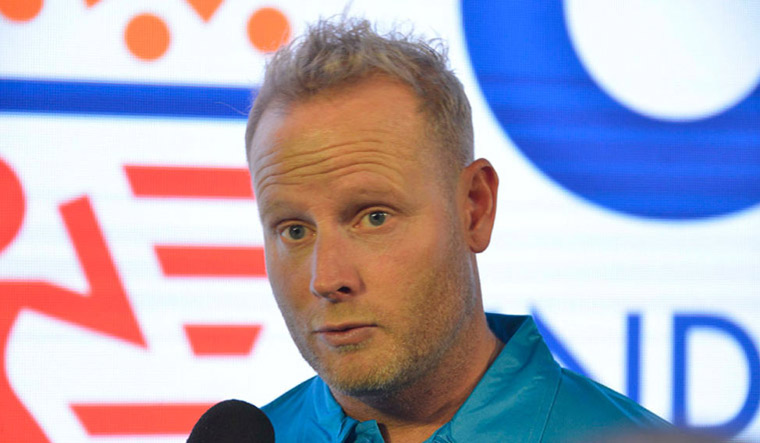Away from the glare of the cameras, the Indian women's hockey team has been training hard under coach Sjoerd Marijne's watchful eyes, for the Tokyo Olympics—their third appearance at the Games. Led by seasoned striker Rani Rampal, the team now has two deputies in Deep Grace Ekka and goalkeeper Savita to help lead a team of 16 which has eight debutants in it.
Marijne said he expects the team to give everything and aim for a place in the quarterfinal in the Tokyo Games. "If we don't make the quarterfinal, I will definitely be disappointed. I know how much effort the girls have put in every day. I know they will give their everything. We are focusing on qualifying for the last eight and working match to match.”
The Dutchman, however, cautioned against having high expectations from the team. India are drawn in a tough pool, comprising 2016 Olympic champions Great Britain, the Netherlands, Ireland, Germany and South Africa.
In a web interaction, where skipper Rani Rampal, Ekka and Savita were present, too, Marijne said that though the grouping was tough, with four teams ranked above India, the team is trained to look beyond rankings. "Rankings mattered for team in the past but for us it is about working match by match. We go into matches to show what we are capable of playing."
Skipper Rani, who would be featuring in her second Olympics, said, "When the Olympics got postponed by a year, it wasn't easy to mentally push yourself for another year. Instead of four years, we were training for five. Staying for extended camps in SAI campus was also not easy but we got the support of all the coaches and SAI staff. As far as pressure is concerned, everyone has to deal with it; even teams who have won a medal previously at the Olympics. We have learnt to handle it. Our mental training coach has worked with us on how to stay in the present and not look beyond."
The team will be making only its third appearance at the Summer Games—the first two being in 1980 Moscow and the 2016 Rio. The Indian eves, playing the Games after 36 years in Rio, finished last, losing all their games barring the first against Japan, which ended in a draw.
"We don't want to remember how we played in 2016. We have improved a lot since then,"said Ekka. Her fellow vice-captain Savita, however, preferred to focus on the learnings from 2016. "It was the first Olympics for us. We were competing after 36 years. We had no experience then. No one was there to share how to deal with the whole experience. Now, we tell the new girls what to expect, and what happened with us."
The team has had two foreign tours earlier this year—to Argentina and Germany—where they could not win a game but Marijne is not too bothered about the results, saying the team has worked hard after that.
With barely a month left for Tokyo Olympics, and no top level international competitive games in sight, Marijne and his coaching staff have put the Indian eves through rigorous training. They are already on Tokyo time. "All our training is above match intensity, so that when the girls play matches, they have less intensity than their training." He said that the extra year that the team has got due to the postponement of the Games, has led to Wayne Lombard, the team's scientific adviser, working more on the girls' strength and speed. "There will be the likes of Australia and the Netherlands who are physically stronger but it doesn't matter. We have fast hands. Since last year, Wayne has worked on their strength and speed a lot."
The Indian women's team has also worked with their analytical coach Janneka Schopman, former member of the Netherlands team which won the gold in 2004 Olympic Games in Athens. She has held the "mindful sessions" with the team which, according to the players, has helped them to get mentally stronger. “The girls are learning to focus on things which they can control through these sessions. Mindfulness is about embracing what you feel, recognise it. If you have nerves, then accept it; it is normal. Be aware and prepared to deal with it."





